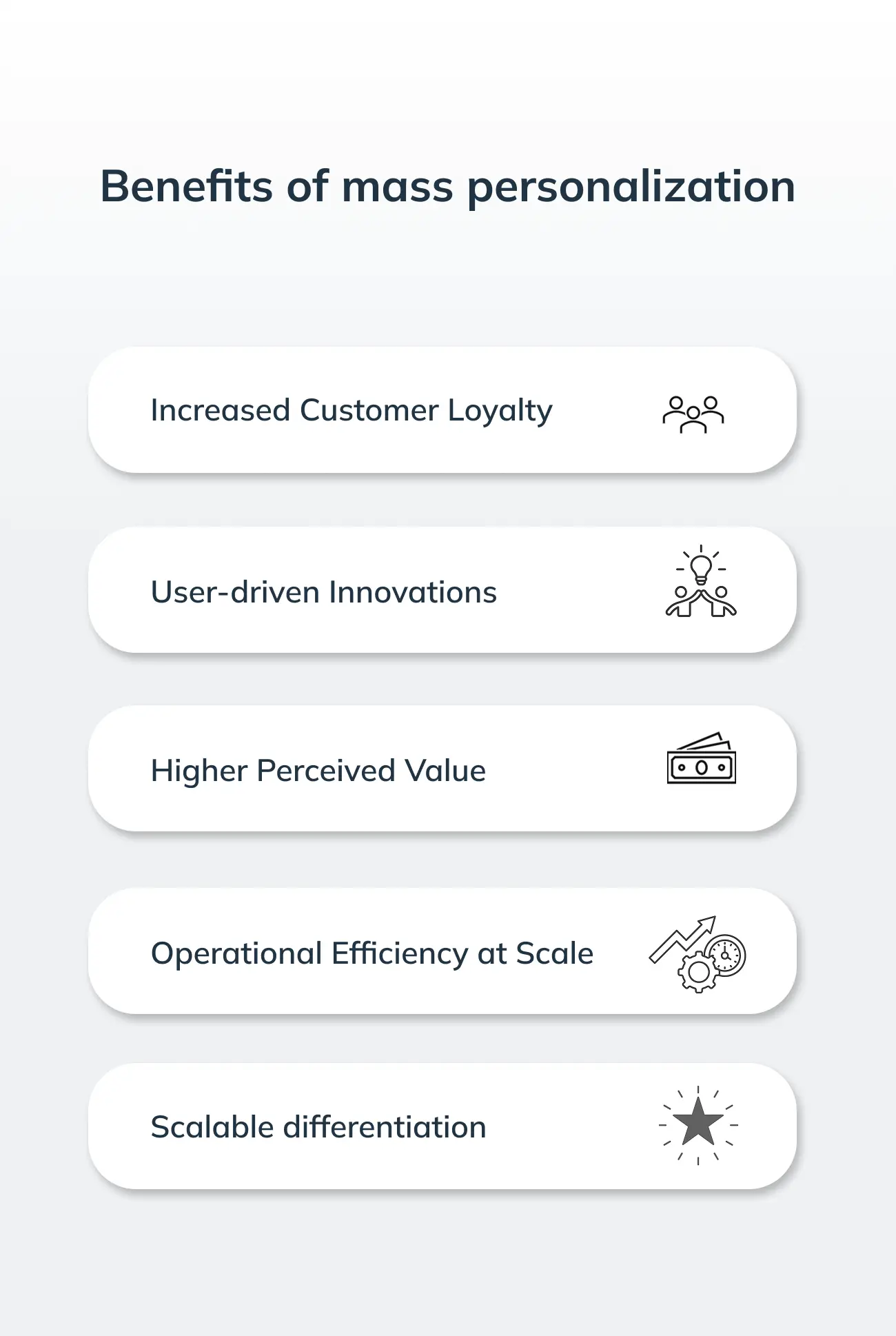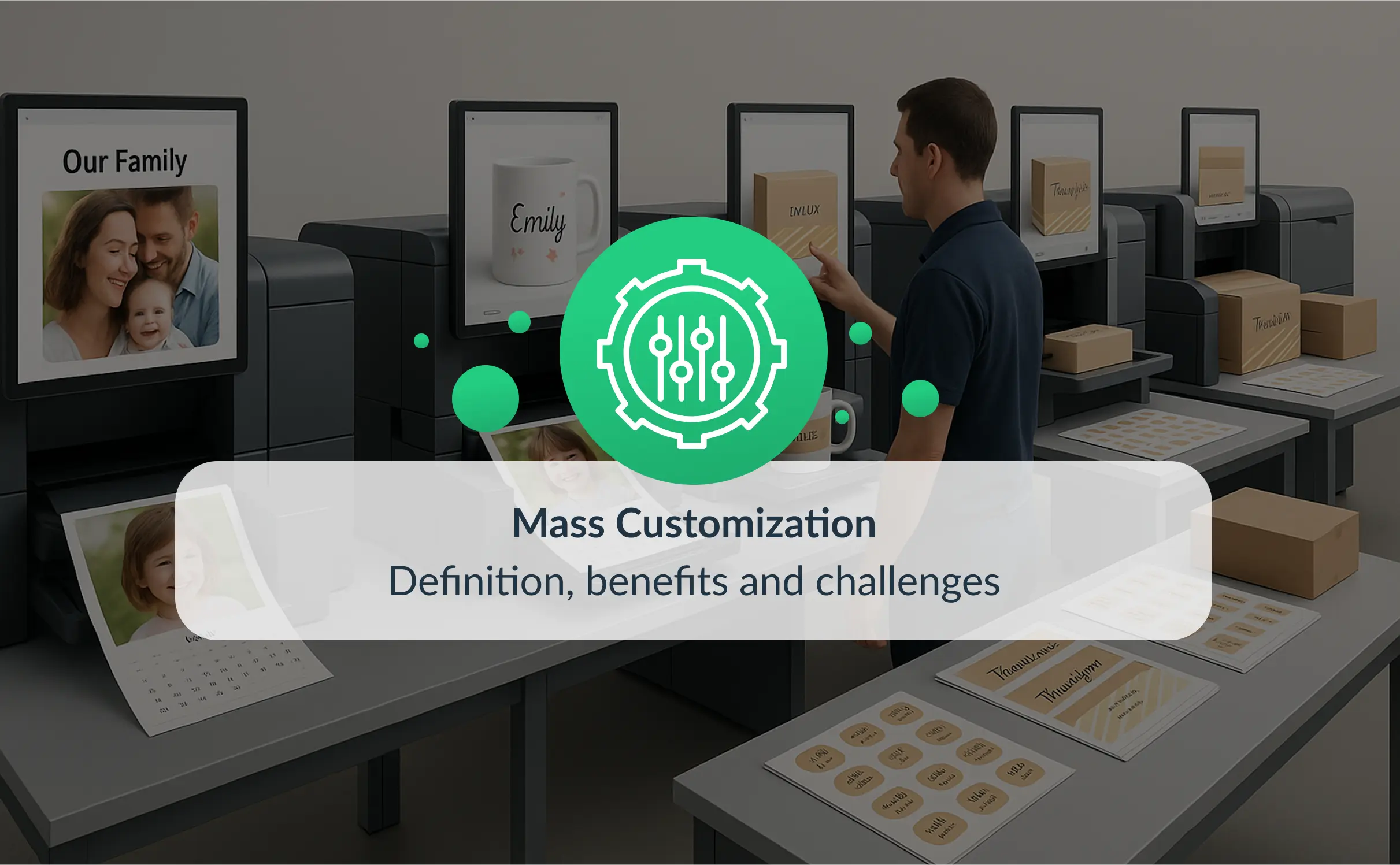Imagine a product team at a photo printing company planning its next peak-season product launch. They’ve nailed operational workflows and sourced high-quality materials, but they hit a wall trying to stand out. Their catalogue feels generic, customer interest has plateaued, and leadership is asking tough questions about differentiation. At that intersection of personalization and scale lies a concept that’s both powerful and often misunderstood: mass customization.
To redefine competitive advantage in the evolving photobooks market, businesses need to see mass customization not just as a buzzword, but as a strategic capability. It allows you to tailor products at scale—without sacrificing efficiency—in a way that meets rising consumer demand for uniqueness, especially across the photo book and album market. But unlocking this value isn’t just about printing software or template variety—it’s about rethinking your entire customization strategy from production to UX.
What is mass customization?
Mass customization is the strategy of delivering tailor-made products with the efficiency of mass production. In the context of personalized photo books and printed albums, it means allowing each customer to create a unique product experience—like a calendar with their own photos, a photobook tailored to an anniversary, or a kids’ book featuring their child as the hero—without running an entirely bespoke production each time.
From a production and process standpoint, mass customization operates at the intersection of flexibility and standardization. It uses modular design, dynamic content, and digital manufacturing (like print-on-demand) to deliver variation without complexity. In personalized product e-commerce, it allows brands to target the long tail of customer preferences—without overwhelming their supply chains. If you’re new to the concept and wondering what is mass customization, it’s important to view it through the lens of both scalability and individualization.
The Four Customization Approaches
Mass customization isn’t one-size-fits-all. Businesses can choose from four key approaches depending on their technical capabilities and customer experience goals:
- Transparent: The customization happens behind the scenes. The system adjusts based on known customer data (e.g., photo source, previous book type) without interrupting the standard flow.
- Adaptive: Customers choose from standard configurations—like selecting pre-made templates or layouts that adjust to their inputs.
- Collaborative: The user designs a product from scratch using an editor. This is common in photo book innovations, where full creative freedom is part of the value.
- Cosmetic: The core product stays the same, but presentation (like cover design or packaging) changes to suit taste or occasion.

Choosing the right approach—or blending them smartly—is key to meeting customer expectations while maintaining operational feasibility. Understanding the distinction also sharpens your own mass customization definition and helps align internal teams on scope. A clear mass customization definition helps harmonize planning and execution across departments.
Benefits of mass customization
When executed right, mass customization is more than a way to make customers feel special. It’s a lever for business differentiation and sustainable growth in the competitive photo book and album market.
Top 5 Strategic Benefits
- Increased customer loyalty
Personalized output fuels emotional investment. When shoppers design a year-in-review photo book or a wedding album, they’re less likely to churn—and more likely to return for seasonal gifts or referrals. - Higher perceived value
Custom products command premium pricing. Offering personalization at scale lets you increase average order value without relying on discounts. - Scalable differentiation
In a saturated photobooks market, being feature-rich isn’t enough. Mass customization lets you differentiate through experience, not just catalog size. - Customer insights for product evolution
The input data from editable products—used themes, favorite templates, preferred formats—can guide future development cycles far more efficiently than surveys or NPS scores. - Operational efficiency at scale
When powered by the right editor and render engine, mass customization doesn’t increase production costs linearly. Instead, it unlocks efficiencies by standardizing backend processes across diverse outputs.
A sound customization strategy doesn’t just unlock personalization—it drives measurable results.

Challenges of mass customization
Mass customization sounds like the best of both worlds – unique products with the efficiencies of mass production. But delivering on that promise is far from easy.
The main challenges fall into three categories:
- Operational complexity: Personalized products introduce variability at every stage – from artwork generation to production and shipping. That variability can break traditional workflows built for large, uniform batches.
- Production scalability: You can’t rely on manual workarounds when dealing with hundreds or thousands of one-off orders. The entire process must be automated and connected.
- Data and system integration: Multiple systems need to “talk” to each other – from your e-commerce platform to your print queue, logistics software, and ERP.
💡 Technology partner insight: ROQ
“Mass customization only works at scale when production equipment, software, and logistics are built to communicate in real time. At ROQ, we’ve seen that many businesses underestimate the complexity of aligning print speed, curing time, garment handling, and data flow. For example, with the ROQ NOW, our industrial DTG platform, a successful mass customization setup isn’t just about printing a different design on each shirt. It’s about integrating with order intake platforms, ensuring barcode tracking at every station, minimizing idle time between jobs, and keeping curing temperatures stable for different fabric types. The ability to maintain throughput while processing unique designs per unit is what separates a scalable operation from a costly experiment.”
This perspective from ROQ reflects a common reality in the industry: the gap between offering personalization and being operationally ready to scale it. Businesses often focus on the what – personalized designs – without preparing for the how – seamless production and fulfillment.
That’s why companies looking to succeed with mass customization must think holistically: software, hardware, logistics, and people – all aligned around a new kind of workflow.
Examples of mass customization
From consumer-grade gifting platforms to enterprise-grade photo product companies, real-world applications show how versatile and effective mass customization can be across business models.
One strong example is the rise in educational children’s books incorporating the child’s name, photo, or illustration likeness. These experiences blend emotional resonance with scalable templates, unlocking both emotional and commercial value. Meanwhile, in the photobook and album market, businesses like Printbox customers offer collaborative customization tools with drag-and-drop layouts, smart autofill, and responsive design previews, making it easier for casual users to generate high-quality layouts in minutes. These are some of the most compelling examples of mass customization today.
Among photo product retailers, there’s increasing interest in intelligent autofill features that use photo metadata—like timestamps, GPS, or tags—to automatically organize layout and storyflow. This feature not only reduces abandonment in the editing process but also shortens time to purchase, especially on mobile platforms where consumer patience is limited.
Another noteworthy case is in B2B gifting experiences, where corporate clients can customize photo calendars or notebooks for internal events, onboarding kits, or client gifts—often with branded themes, employee photos, and personal messages. It’s part of delivering a Personalized Customer Experience at scale, while enhancing operational repeatability. These B2B applications represent effective mass customization marketing tactics and underline how mass customization companies differentiate themselves through innovation.
In short, the best examples of mass customization show how brands deliver personal touches—without sacrificing consistency or profitability.
Conclusion
Mass customization isn’t the future of personalized printing—it’s the differentiator of the present. As customer expectations evolve beyond “choose your design” into “make it yours,” photo product businesses have a unique opportunity to lead with flexibility, creativity, and efficiency. The real question isn’t just “what is mass customization” but how ready your organization is to embrace it strategically.
For those in the personalized photo books space, now is the time to align production, UX, and marketing around a unified vision. Consider where you fall across the spectrum of customization types. Refine your offering based on the top benefits and customer readiness. And most importantly, ask yourself: what is the goal for mass customization? If the answer is sustainable growth, deeper loyalty, and meaningful experiences, then the path forward becomes clear.
For a look ahead, explore AI: The Future of Personalized Printing to see how intelligent automation is accelerating the next wave of customization—and redefining mass customization manufacturing along the way.
Whether you’re optimizing your existing customization business or seeking strategies from mass customization companies, the time to act is now. And with a clear understanding of the custom production definition at the operational core, your competitive edge is within reach.
Want to see how smart customization meets operational scalability? Book a Printbox demo to explore what’s possible. Have questions on aligning your systems or want to dive deeper into implementation? Contact the Printbox team to start a tailored conversation.




